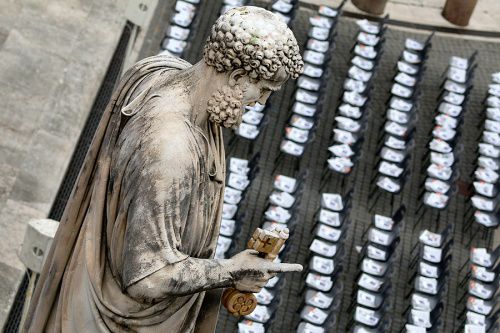Pope Francis completed the membership of the new Vatican body with responsibility for dealing with clerical sex abuse on Wednesday, marking a further step in providing adequate procedures to insure justice for all the victims. The body is a specific office within the Congregation for the Doctrine of the Faith that will deal with 'delicta graviora', or 'more grave crimes'. These are the most serious crimes in the Church, and most notably include offenses against morality: the sexual abuse of a minor by a cleric; or the acquisition, possession, or distribution of child pornography by a cleric. The new office is established as a college of seven people, whose names were announced Jan. 21. Bishop Charles Scicluna has been appointed president of the college. Now the Auxiliary Bishop of Malta, Bishop Scicluna served from 2002 to 2012 as Promoter of Justice in the Congregation for the Doctrine of the Faith — that is, as the Vatican's public prosecutor — personally handling the sex abuses crises of 2002 and 2010 and carrying forward the ‘zero tolerance’ line wanted by St. John Paul II and Benedict XVI to tackle the issue. The other members of the college are: Cardinal Zenon Grocholewski, prefect of the Congregation for Catholic Education; Cardinal Attilio Nicora, president emeritus of the Administration of the Patrimony of the Apostolic See; Cardinal Francesco Coccopalmerio, president of the Pontifical Council for Legislative Texts; Bishop Juan Arrieta Ochoa de Chinchetru, secretary of the Pontifical Council for Legislative Texts; Cardinal Giuseppe Versaldi, president of the Prefecture for the Economic Affairs of the Holy See; and Archbishop José Mollaghan, Emeritus of Rosario. The college has also two supplementary members: Cardinal Julian Herranz Casado, president emeritus of the Pontifical Council for Legislative Texts; and Bishop Giorgio Corbellini, president of the Labour Office of the Apostolic See and of the Disciplinary Commission of the Roman Curia. The new office is charged with lightening the work of the ordinary session of the Congregation for the Doctrine of the Faith, handling the appeals on 'delicta graviora'. Aside from sexual abuse of minors, the 'delicta graviora' which the college will examine include those against the sacraments -- including those against Eucharist, such as profaning a consecrated Host; against Confession, such as violating the seal; and against Holy Orders, such as the attempted ordination of a woman.
According to the 2001 motu proprio Sacramentorum sanctitatis tutela, which transferred authority for investigating abuse cases from the Congregation for Clergy to the Congregation for the Doctrine of the Faith so that they could be dealt with more speedily, a person aggrieved by an administrative decision of the Congregation for the Doctrine of the Faith could ask for a review of the decision by the ordinary session of the congregation. This session is called ‘feria quarta’, and takes place once a month on a Wednesday, and includes all 25 cardinal and bishop members of the congregation. The new office will assist the Congregation for the Doctrine of the Faith in this work. According to Fr. Federico Lombardi, director of the Holy See press office, the congregation “had to examine 4-5 appeals a month, of priests who were deemed to have been wrongly accused.” It is yet to be decided how the new college will organize the work, nor if the college’s judgement on each case will be always accepted by the feria quarta, or if the feria quarta will be able to overturn the college's judgements. The work will obviously depend on the number of cases waiting for review, and monthly meetings will be likely scheduled. The rescript simply reads that the work of the commission will juxtapose the work of the Congregation for the Doctrine of the Faith, which will maintain its competences. It will be likely the congregation itself entrusts the new office with a certain numbers of appeals which are usually examined during the ordinary session. All of these details will be discussed in the further months, probably with the issuance of specific regulations that will establish the functions and modus operandi of this new body.
